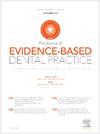EFFICACY OF HYALURONIC NANOGEL SPRAY FOR TREATING DRY MOUTH: A RANDOMIZED CROSSOVER STUDY
IF 4
4区 医学
Q1 DENTISTRY, ORAL SURGERY & MEDICINE
引用次数: 0
Abstract
Objectives
To evaluate the efficacy of Hy-N spray in dry mouth patients.
Materials and Methods
A randomized double-blind crossover study was conducted on patients with dry mouth. They were given 3 saliva substitute sprays: Hy-N, placebo, and Biotène. The unstimulated whole saliva flow rate (UWSFR), salivary pH, and xerostomia questionnaire (XQ) were evaluated at baseline and after 1 week of treatment with each spray. Patient satisfaction was evaluated after each treatment period.
Results
Twenty-nine patients completed the study. After using the Hy-N and Biotène sprays for 1 week, the UWSFR significantly increased from 0.12 ± 0.16 at baseline to 0.16 ± 0.18 mL/min postspray usage (P = .04, P ≤ .01) with moderate improvement. None of the sprays affected salivary pH (P = .72). The mean XQ score also significantly decreased from 34.2 ± 21.4 at baseline to 23.7 ± 17.4, 23.1 ± 15.2, and 26.5 ± 17.7 after using Hy-N, Biotène, and placebo spray, respectively (P = .001, P = .011, P = .009) with moderate improvement. Biotène was the most preferred saliva substitute spray, followed by Hy-N spray.
Conclusion
Using the Hy-N and Biotène for 1 week relieves subjective and objective dry mouth. They can be a useful product in the management of dry mouth without causing side-effects.
透明质酸纳米凝胶喷雾治疗口干的疗效:一项随机交叉研究
目的评价Hy-N喷雾剂治疗口干患者的疗效。材料与方法对口干患者进行随机双盲交叉研究。给予3种唾液替代喷雾剂:Hy-N、安慰剂和biot。在基线和每次喷雾治疗1周后评估非刺激全唾液流率(UWSFR)、唾液pH值和口干问卷(XQ)。每个治疗期结束后评估患者满意度。结果29例患者完成了研究。使用Hy-N和biot喷雾剂1周后,UWSFR从基线时的0.12±0.16显著增加到喷雾剂使用后的0.16±0.18 mL/min (P = )。04, P≤0.01),有中度改善。喷雾剂均不影响唾液pH值(P = .72)。使用Hy-N、biot和安慰剂喷雾后,XQ平均评分也从基线时的34.2±21.4显著降低至23.7±17.4、23.1±15.2和26.5±17.7 (P = )。001, P = 。011, P = .009),有中度改善。biot是首选的唾液替代喷雾剂,其次是Hy-N喷雾剂。结论hyn联合biot治疗1周可缓解主客观口干症状。它们是治疗口干的有效产品,而且不会产生副作用。
本文章由计算机程序翻译,如有差异,请以英文原文为准。
求助全文
约1分钟内获得全文
求助全文
来源期刊

Journal of Evidence-Based Dental Practice
DENTISTRY, ORAL SURGERY & MEDICINE-
CiteScore
6.00
自引率
16.70%
发文量
105
审稿时长
28 days
期刊介绍:
The Journal of Evidence-Based Dental Practice presents timely original articles, as well as reviews of articles on the results and outcomes of clinical procedures and treatment. The Journal advocates the use or rejection of a procedure based on solid, clinical evidence found in literature. The Journal''s dynamic operating principles are explicitness in process and objectives, publication of the highest-quality reviews and original articles, and an emphasis on objectivity.
 求助内容:
求助内容: 应助结果提醒方式:
应助结果提醒方式:


